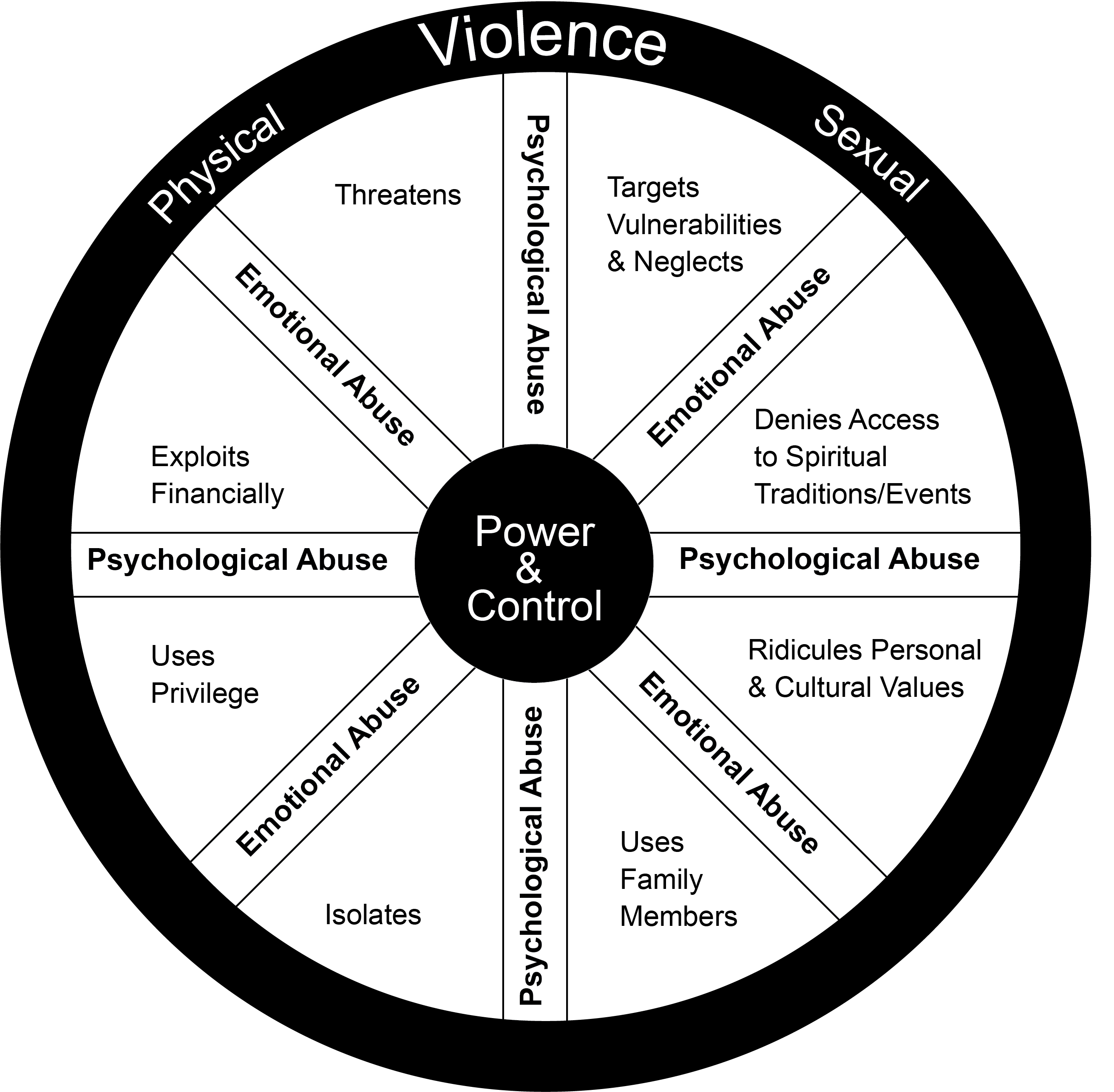This section presents resources and research articles that offer an overview of abuse in later life and elder abuse, including domestic violence, dating violence, sexual assault, and stalking. The section on cultural considerations lists some selected materials representing diverse perspectives on elder abuse.

Abuse in Later Life & Elder Abuse Information Sheets
This series of information sheets provide data and resources to service providers and justice professionals who may work with older victims.
Abuse in Later Life Wheel
This abuse in later life power and control wheel describes different types of abuses that occur in later life and tactics used by abusers to exercise power and control over their victims. This wheel was developed in consultation with survivors of later life abuse.
Abuse in Later Life: An Overview and Practical Strategies for Supporting Older Victims
Abuse in Later Life Overview
Elder Abuse Overview
Elder Abuse: Red Flags and Warning Signs
Frequently Asked Questions on Abuse in Later Life
Intimate Partner Violence in Later Life
Sexual Violence in Later Life: Fact Sheet
Sexual violence can affect individuals across the life span, including people in later life. This two page document offers information concerning sexual abuse in later life, including barriers to response and prevention, victims and perpetrators.
Sexual Abuse in Later Life
Stalking in Later Life
When Adult Children or Grandchildren Abuse an Older Family Member
Working with Victims Ages 50-62 Years Old
A Statewide Profile of Abuse of Older Women and the Criminal Justice Response
This statewide study in Rhode Island of domestic violence in older women and the response of state authorities found a relatively larger proportion of intimate partner abuse than previously found in adult protective service surveys.
Broken Trust: Elders, Family, and Finances
Detecting, Addressing and Preventing Elder Abuse in Residential Care Facilities
This study focused on detection, investigation, and resolution of elder abuse and neglect complaints in what are known as residential care facilities (RCFs).
Domestic Violence Against Older Women: Final Technical Report
This qualitative study report examines domestic violence in older women. The report presents older women's definition of domestic violence, their views about causes, reporting, interventions, and consequences for perpetrators, and barriers to help seeking.
Financial Abuse of Elderly People vs. Other Forms of Elder Abuse: Assessing Their Dynamics, Risk Factors, and Society’s Responslderly People vs. Other Forms of Elder Abuse: Assessing Their Dynamics, Risk Factors, and Societys Response
The purpose of this study was to examine the dynamics and societal response to financial exploitation that did not co-occur with other forms of elder abuse and compare it to financial exploitations that did occur with other forms of elder abuse, including physical abuse and neglect.
National Elder Mistreatment Study
Findings of this nationally representative study showed that more than one in ten respondents experienced some type of abuse or potential neglect in the past year.
Prevalence and Correlates of Emotional, Physical, Sexual, and Financial Abuse and Potential Neglect in the United States: The National Elder Mistreatment Study
Findings of this nationally representative study showed that more than one in ten respondents experienced some type of abuse or potential neglect in the past year.
Sexual Violence in Later Life: Research Brief
This brief reviews research on risk and protective factors related to sexual violence in later life.
The True Link Report on Elder Financial Abuse 2015
Understanding Elder Abuse: New Directions for Developing Theories of Elder Abuse Occurring in Domestic Settings
This paper discusses theory-based explanations of what causes elder abuse and how best to respond to it.
Under the Radar: New York State Elder Abuse Prevalence Study Self-Reported Prevalence and Documented Case Surveys
In this comprehensive study researchers studied the prevalence and incidence of various forms of elder abuse through direct communication with older New Yorkers over 60 years of age and the number of elder abuse cases coming to the attention of all agencies and programs responsible for responding to elder abuse in New York State.
Violent Crime against the Elderly Reported by Law Enforcement in Michigan, 2005-2009
This report presents information about criminal victimization and incidents of violent victimization of persons age 65 or older known to law enforcement in Michigan.









